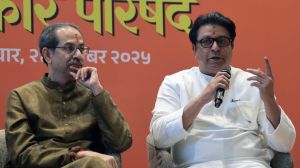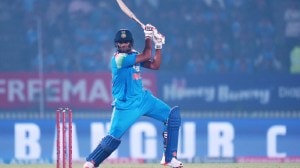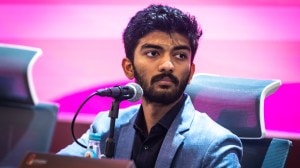Mocking the Republic
It is an irony that the celebration of the 50th anniversary of our Republic is being organised by those who made no contribution to the es...

It is an irony that the celebration of the 50th anniversary of our Republic is being organised by those who made no contribution to the establishment of the Republic or to the elaboration of the Constitution which underpins it. Vajpayee8217;s ilk were on the lam, underground or in jail, through most of the period May 1948 to November 1949 that the Constituent Assembly debated and drafted this precious document. Gandhiji had been cruelly assassinated a few months before the first draft was tabled. The chief assassin was the editor of a rag called Hindu Rashtra8217;. It is those who wish to replace the secular India of the Constitution with a Hindu Rashtra who are organising the 50th anniversary celebrations.
At one level, of course, it is a remarkable tribute to the wisdom of the founding fathers that the Constitution should be large hearted enough to accommodate within its ambit the entire spectrum of ideology about the nature of India8217;s nationhood. At another level, it explains why those organising the celebrations are doing so primarily by targeting the constitutional structure of our Republic. I refer, of course, to the Constitutional Review Commission, a wholly extra-constitutional executive device to undermine the edifice of our democracy.
That they will not succeed because the Constitution itself prohibits the translation by executive fiat of the Commission8217;s ruminations into changes in the Constitution is, of course, the saving grace. But to even conceive an inquisition by an unauthorised body as the way of marking the golden jubilee of the Constitution is to mock the Republic.
For we have only to look about us in our immediate neighbourhood to realise what a miracle it is that the Constitution has survived 50 years and looks set, notwithstanding Vajpayee8217;s machinations, to survive many more fifty years. Not one of the constitutions of our neighbourhood has endured. Pakistan is the obvious example. Democratic Burma has collapsed into a cruel dictatorship called Myanmar. Nepal has heaved its way through convulsion after convulsion. Bangladesh saw the genocidal elimination of the entire leadership which brought it to freedom. Most telling, from our point of view, is Sri Lanka, where after a massive election victory in 1977, Junius Jayawardene 8212; the precise equivalent of the BJP/RSS/VHP in that once-lovely island 8212; succeeded in doing what Vajpayee can only fantasise about. He overthrew the old constitutional order, re-wrote the constitution, installed himself as president and set about making a Singapore of Sri Lanka. Instead, it took a twinkle of the historical eye forJayawardene8217;s constitutional coup to transform itself into a bitter ethnic war which rages till today.
We must never forget that India is among the very, very few countries to have come to liberation in the 20th century which has translated independence for the nation into freedom for its people. It is the political miracle of contemporary times, quite on par with the economic miracle of south-east and east Asia. Yet, while the people of those lands celebrate their miracle, our sour-pusses pile up their petty grievances and nurse their regrets like a dog licking its wounds. This week is the week to remember that in all of Asia only two Constitutions have endured: China8217;s, which is a monument to the denial of human liberty, and India8217;s, which is an affirmation of the ineluctability of the freedom of humankind.
It is also the occasion to recognise that the miracle nations of south-east, east and west Asia have all got where they have through the authoritarian route. We cannot have it both ways. We cannot envy their economic miracle and brush under the carpet our political miracle. True, some of them, like the Republic of Korea and Taiwan, have emerged as recognisable democracies after their economic revolutions. But is it feasible, let alone desirable, to even consider abandoning our political path to embrace theirs? The great given in our political system is the Constitution. That is a Constitution which places the freedom of the individual and the rights of the individual as the cornerstone of our polity.
It also puts in place another corner stone, secularism, meaning the rights of the minority communities, religious and linguistic, to full citizenship and undiminished identity without any unwarranted interference by the majority. It is in this invaluable sense that the civilisational principle on which we have evolved over 5,000 years is enshrined in the Constitution: unity in diversity, celebrating the belief that everything which promotes our diversity strengthens our unity, anything which encourages uniformity threatens our unity. We are one because we are diverse. We are a single people, a single nation because the Constitution entitles each one of us to an ethnic identity as the assurance of a national identity, which does not compel us to choose between the diversity of our identities, which does not pit identity against identity as the validation of our nationhood.
Both the Soviet Union and erstwhile Yugoslavia made the crucial constitutional mistake of forging a single Republic out of what they themselves called a congeries of peoples and a congeries of nations. Inevitably, the congeries disintegrated into a slew of nations and a slew of peoples. The failure to integrate ethnic identity with a single national identity is the root cause of the collapse of most heterogeneous nations. India8217;s is the outstanding example of a people celebrating their diversity by affirming their unique nationhood.
The BJP knows none of this. The proof is the slogan which unites the sangh parivar: quot;Garv se kaho hum Hindu hainquot;. The rest of us say: quot;Garv se kaho hum Hindusthani hainquot;. Therein lies the crucial difference, the rift valley which separates the BJP conception of the nature of our nationhood from that of the rest of us. Which is why the most dangerous threat to the continuation of our Republic is the commission constituted by those who have little understanding and less comprehension and no sympathy with what has made us a united and integrated nation, and, therefore, a great nation. To even consider the recommendations of the commission8217;s report would be an insult to the nation and a denigration of our Republic.
If the government of the day wishes to change any element of ourConstitution they are welcome to bring their proposals to Parliament. But because they cannot secure their nefarious purpose in a straightforward way, lacking as they do the required majority in the Lok Sabha and lacking a majority entirely in the Rajya Sabha, the Constitutional Review Commission is their chosen instrument for denigrating the Republic. They must not be allowed to get away with it. Let that be the nation8217;s Golden Jubilee resolve.
The attempt to review the Constitution is an insult to the nation and a denigration of our Republic
- 01
- 02
- 03
- 04
- 05































